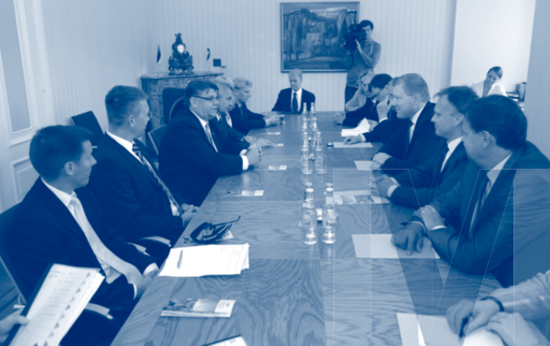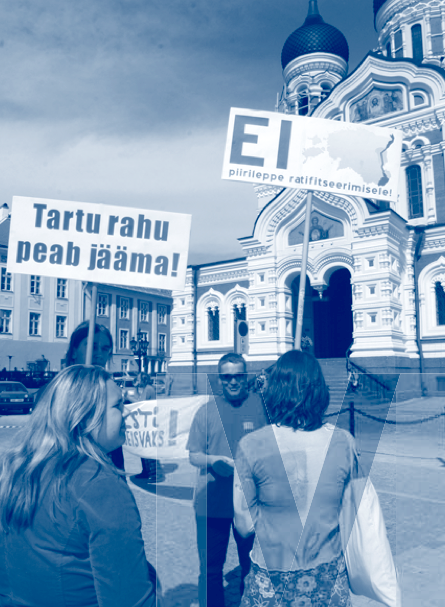In December 2011 you defended your doctorate on a topic very familiar to you as a longstanding member of the Riigikogu, as you have served five consecutive terms and foreign policy is one of your main fields. How difficult or easy was it to write your dissertation due to your background?
In general, the principle is not to start research if you don’t know your source material. I certainly knew very well what source material I would be able to obtain and where. All of my interviews were conducted with people I know personally. No one feared that I would take advantage of them in the political arena; they understood that it was a research paper. It would have doubtless been much harder for an outsider.
The pure heft of your paper is intimidating even for a doctoral dissertation – over 300 pages. A very large part of it consists of analysis of the development of the competence of the Riigikogu as an institution. Why such a choice?
To analyze foreign policy competence, I had to work through parliamentary documentation in its entirety, because foreign relations are also part of the work of the Riigikogu. If I hadn’t performed a thorough analysis of how the competence developed, the number of pages would have been far fewer. But it isn’t possible to select Riigikogu transcripts and minutes by categorizing only some of them as foreign policy-related. Only through analyzing the entire activity of parliament can the foreign policy aspects – actually a relatively small part of the work of the Riigikogu – be explored. Foreign policy is a continuation of domestic policy. The state is paramount, it deals with its affairs and foreign relations support it.
The competence and activity of parliament in foreign relations has been very important to the restoration and consolidation of Estonia’s independence, restoring foreign relations and accession to international organizations. The Riigikogu has dealt with topics related to the Estonian-Russian border treaty, which is a key factor for stimulating (economic) relations between Estonia and Russia and improving Estonia’s investment climate. The activity of the Riigikogu in the process of European Union accession is very important. Thus the Riigikogu is extremely important in Estonian economic, political and social life and besides its historical background and current state, the future dimension is also important as it gives an idea of what type of government Estonia is developing toward. Democracy and parliamentarism are in constant development and the rapid changes in the international environment lead to inevitable changes in the Estonian model of government. The role of the parliament in the process of making decisions may increase, decrease or stay the same, but it can also become transmuted due to diversification of decisionmaking levels.
In the domestic context, these factors are elements of direct democracy – that is, how representative democracy is related to further development of civil society – and the balance of the legislative, executive and judiciary. Traditionally, popular initiative and referendum have been elements of direct democracy. Both have served as part of Estonia’s state decision-making mechanism. The current constitutional system does recognize popular initiative, but such issues and initiatives are raised regularly in Estonia. Referendums in Estonia’s system of governance are currently decidedly centred on the Riigikogu, as only parliament may adopt the decision to hold a referendum. Yet unlike in many other European democracies, a decision to hold a referendum is binding for government bodies. But it has not always been so, and time and again the question arises: shouldn’t it be possible to hold a referendum as the
initiative of some other authority – the president, cabinet, or the citizenry? Ratification of foreign agreements at referendum is not allowed under the current Constitution, but this can be amended. A referendum on foreign policy orientation has already been held in Estonia (for accession to the European Union) and in principle it is not out of the question that other such choices of orientation would be made at referendum. All this puts the Riigikogu’s competence in foreign relations in a new light.
There are also other instruments of direct democracy. A rapidly developing civil society means many different interest groups – associations, NGOs, trade unions etc – have increased influence on representative bodies. Already now, public opinion has a strong impact on the decisions of the Riigikogu and the government, including in foreign relations. In future, the impact of civil society on these decisions will only grow.
The political competence of the cabinet is changing. In a globalizing world, decisions must be made quickly and in a quality manner. In particular, this goes for foreign policy decisions. From this perspective it is easy to criticize traditional parliamentarism as slow and cumbersome and depict the process of making decisions in Estonia as not in step with today’s requirements. It encourages the government to do whatever it wants and allows it to push the legislature aside. Making decisions in the EU and NATO also requires the government to act efficiently. And these decisions involve the topics of state secrets and international security, the Riigikogu is left out of many decisions to which it was thus far party. Parliament does not necessarily lose its right to access state secrets, but centralized decision-making and the need for rapid reaction time mean that it will only learns of it after the fact. An analysis of the foreign relations competence of parliament and government should help show whether the changes are in conformity with the principles of parliamentary government and how far the trend can go.
A rally held on 13 August 2008 on Tallinn’s Freedom Square in memory of those killed in the Georgia-Russia war. The speaker is Mart Nutt. Photo: Scanpix
What is political competence?
In fact there are two main types of competence in government – legal and political competence.
Legal competence arises from the Constitution, legislation and international legal acts. The constitution governs the competence of government institutions in different fields, as well as the official duties of the Riigikogu and government and the distribution of their duties, and the decision-making mechanism and hierarchy of decisions, including in foreign policy and international relations. The function of legislation is to further refine the Constitution. International legal acts include conventions, treaties, operating principles of international organizations and the like. Legal competence takes the form of institutional competence, including distribution of competence of the legislative and executive branches.
Political competence is related to ingrained operating modes (traditions, customs), covering the performance of everyday duties and division of labour. Political competence does not stem from institutional position in government. Political competence is impacted by the public’s trust in parliament and the cabinet as well as the readiness of the civil service to take into account the principles of public opinion, the legislature and civil society. In the legal sense, the president is the Estonian head of state and thus the top official, the president of the Riigikogu (speaker) is second and the Prime Minister comes third, but in actuality the chief executive – the prime minister -- has the broadest competence. This is a good example of the great shift in legal and political competence. With regard to shaping foreign policy, it is important to analyze who exercises it and how independent a given body with foreign policy competence is in its activities. Thus competence and power largely coincide in the way in which public authority is organized.
A property of legal and political competence is general competence – the capacity to exercise power, and the necessary preparations and means for doing so.
In my dissertation, I analyzed the competence of the Riigikogu, the legislative assembly. I dealt with the competence of the cabinet as the executive insofar as it was necessary to analyze the competence of the Riigikogu.
The competence of the Riigikogu in foreign relations encompasses legal and political competence. The legal competence of the Riigikogu stems directly from legal acts. In other countries – at least in democracies – parliament’s legal competence is determined on the same grounds. Political competence can vary greatly from one country to another, depending on the practice that has developed over time in international relations. The boundary between legal and political competence is not always clearly delineated, and thus disputes may arise from time to time over the competence of different institutions in countries with different legal systems and historical backgrounds. In the practical shaping of political decisions, the ostensibly less important issue of exercise of public authority often becomes central.
Meeting between the Riigikogu’s Foreign Affairs Committee and a delegation from Finland’s Eduskunta on
25 September 2011. Photo: Scanpix
The Riigikogu has done well. But the importance of the representative body in governance has changed. The role of parliament has been constantly decreasing. In the seventh Riigikogu power was still in the hands of the parliament, but in the ninth Riigikogu, no longer. The reason for the analysis of the ratification of the Russia-Estonia border treaty and the EU accession was the fact that government had no option of taking action in these cases without the parliament. Because of this, the results were completely different from originally planned. The border treaty is not in force, as the Riigikogu ratified it in a manner that is not acceptable for the Russian Federation, leading the latter to retract its signature in a so-called undiplomatic fashion. In the case of EU accession, the Riigikogu supported the accession with great unanimity and the government did not use “force” to make the parliament bend to its will. Dissent regarding accession occurred more in the government coalition, not the parliament, as one member of the coalition, the Centre Party, split on this issue. The opposition thus decided the issue.
In your dissertation, you define foreign policy as more the domain of the cabinet, where parliament does not have much of a say.
In foreign policy, issues must be resolved efficiently, as they arise. Many things are decided at summits, for instance. When two countries’ heads of state, head of government or foreign ministers get together, they must have a chance to decide things on the spot. It simply is not possible to involve parliament. The Vienna Convention* says that three persons at the state level – president, prime minister and foreign minister – have the right to sign international agreements without special authorization. No one else has this right. True, parliament can raise challenges to the treaty later on. But in the interim, the agreement is valid. There is an example from the history of the United States where Congress withheld ratification of a treaty. That is the prerogative of the legislature
There are less frequent and fewer opportunities of getting an overview of the government’s activities.
Perhaps this is partly due to laziness on the part of parliament. If no one asks, no one tells.
Foreign policy was the first field that the Riigikogu started regularly discussing in plenary session. The Foreign Relations Act adopted in 1993** obliged the Riigikogu to discuss foreign policy and the making of foreign policy at least twice a year in plenary session. In the course of foreign policy discussions, the foreign minister and chairman of the parliamentary foreign affairs committee delivered addresses. The foreign policy discussion requirement was enacted at the initiative of the Riigikogu and the Ministry of Foreign Affairs was not all that pleased. The Riigikogu assumed that it would become a format through which Parliament would become involved in the making of foreign policy decisions as the need arose. That is not the way things worked out. The discussion turned into the Foreign Minister’s address to the Riigikogu, but the Riigikogu did not enjoy increased opportunity to influence foreign policy as a result. It definitely became a positive practice, but it did not affect competences in any way.
In general, foreign relations practice has taken clear shape in parliament and there is no need for changing it. Two facets should be distinguished in foreign relations: the legal side, including treaties and foreign policy statements through which we shape the overall foreign policy doctrine.
Through the foreign affairs committee, the Riigikogu essentially has all the opportunity it needs to contribute to shaping foreign policy. Yet there is so much material that the committee is unable to process it all. The Ministry of Foreign Affairs personnel testify regularly before the committee and introduce foreign policy initiatives. There is no other option but to trust the decision of the foreign minister and senior ministry officials on what is important and what is not. It would not serve the best purposes to get a prior endorsement from the foreign affairs committee for treaties. Most treaties are very specific and the cabinet discusses all agreements before signing anyway. Shaping foreign policy is not in anyone‘s sole competence, it is collective work where the initiative comes from many sides. The initiative for entering into treaties and agreements often comes from the foreign party.
A demonstration against the new border treaty between Estonia and the Russian Federation was held on 15 June 2005 outside the Riigikogu during the discussion on the ratification of the controversial agreements. Photo: Scanpix
But parliament does engage directly in foreign policy.
But it does. On a good number of levels. There is the OSCE parliamentary assembly, the Inter-Parliamentary Union (IPU)***, the Parliamentary Assembly of the Council of Europe (PACE), and regional associations such as the Council of Baltic Sea States and the Baltic Assembly. I would say that international relations at the parliamentary level is even more important than bilateral intergovernmental relations, as these relations are regular and occur many times a year. Policy is shaped cooperatively and information of mutual interest is exchanged, factions communicate directly with parties who share political views. There is the possibility to have dealings with many legislatures and assemblies without having to travel to the other country with a delegation.
To some extent, relations also take place through friendship groups, but friendship groups receive too little funding in the Riigikogu to organize visits. For this reason, relations take place with those who are interested themselves and pick up part of the expenses, such as the People’s Republic of China.
REFERENCES* Vienna Convention on the Law of Treaties.** RT I 1993, 72/73, 1020 clause 7 of Section 5.*** IPU - International Parliamentary Union, which works closely with the UN.
Mart Nutt’s dissertation “Development of the competence of the Estonian parliament and its application in foreign relations” has been published online in the Tallinn University of Technology Library digital collection, http://digi.lib. ttu.ee/i/?635









